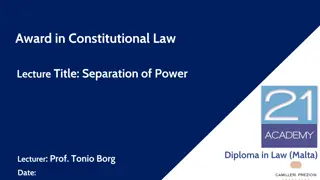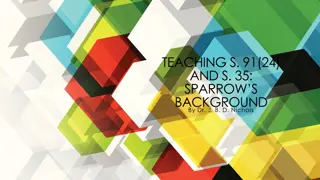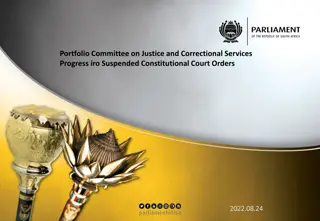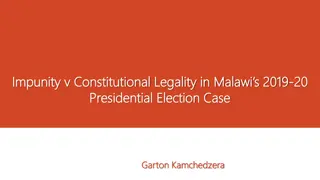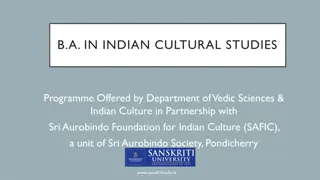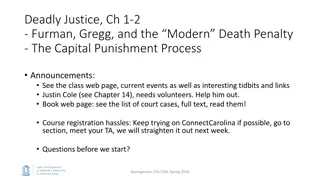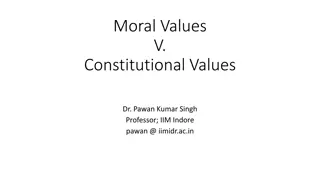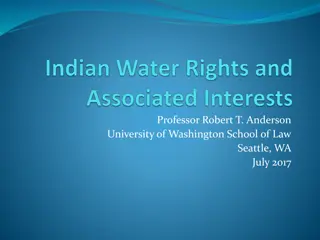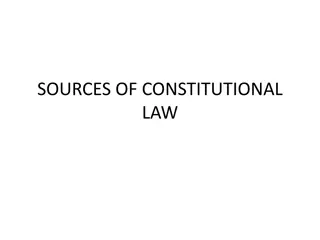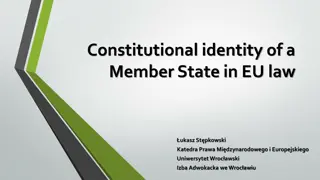Evolution of Article 21 in Indian Constitutional Law
Article 21 of the Indian Constitution ensures the protection of life and personal liberty, emphasizing the importance of adhering to procedures established by law when depriving individuals of these rights. There was deliberation during the Constituent Assembly on the wording of this article, ultimately deciding to use "according to procedure established by law" over "due process of law". This provision has evolved through judicial interpretations, including in the landmark Maneka Gandhi case, highlighting the significance of fair and reasonable procedures in upholding fundamental rights.
Download Presentation

Please find below an Image/Link to download the presentation.
The content on the website is provided AS IS for your information and personal use only. It may not be sold, licensed, or shared on other websites without obtaining consent from the author.If you encounter any issues during the download, it is possible that the publisher has removed the file from their server.
You are allowed to download the files provided on this website for personal or commercial use, subject to the condition that they are used lawfully. All files are the property of their respective owners.
The content on the website is provided AS IS for your information and personal use only. It may not be sold, licensed, or shared on other websites without obtaining consent from the author.
E N D
Presentation Transcript
ARTICLE 21 Indian Constitutional Law Prof. (Dr.) Anand Paliwal Dean & Chairman Faculty of Law, Mohanlal Sukhadia University, Udaipur (Raj.)
Article 21 provides that no person shall be deprived of his life or personal liberty except according to procedure established by law. Although Article 21 is one of the shortest in the Constitution, there was a lot of controversy over it in the Constituent Assembly. Originally, the Article provided that "no person was to be deprived of his life or liberty without due process of law" It was the Drafting Committee of the Constituent Assembly which substituted the words "except according to procedure established by law" for the words "without due process of law".
Dr. Ambedkar summarised the arguments on both sides in these words, "We are, therefore, placed in between two difficult positions. One is to give the judiciary the authority to sit in judgment over the will of the legislature and to question the law made by the legislature on the ground that it is not good law, in consonance with fundamental principles. Is that a desirable Principle? The second position is that the legislature ought to be trusted not to make bad laws. It is very difficult to come to any definite conclusion.
The Constituent Assembly ultimately decided in favour of the change made by the Drafting Committee. The members were influenced by the provisions of the Constitution of Japan of 1946 which omitted the phrase due process of law" and included the phrase "procedure established by law". The members were not prepared to allow the judiciary to act as a super legislature. The Drafting committee considered procedure established by law to be more specific. However the decision in Maneka Gandhi case has brought the concept of due process of law by the back door.
The most important words in this provision are procedure established by law. A.K. Gopalan v. State of Madras, AIR 1950 SC 27 where the validity of the Preventive Detention Act, 1950, was challenged. The main question was whether Art. 21 envisaged any procedure laid down by a law enacted by a legislature, or whether the procedure should be fair and reasonable. On behalf of Gopalan, an attempt was made to persuade the Supreme Court to hold that the Courts could adjudicate upon the reasonableness of the Preventive Detention Act" or for that matter, any law depriving a person of his personal liberty.
A three pronged argument was developed for this purpose: (1) The word 'law' in Art. 21 does not mean merely enacted law but incorporates principles of natural justice so that a law to deprive a person of his life or personal liberty cannot be valid unless it incorporates these principles in the procedure laid down by it. (2) The reasonableness of the law of preventive detention ought to be judged under Article (3) The expression 'procedure established by law' introduces into India the American concept process which enables the Courts to see whether the law fulfils the requisite elements of a reasonable procedure. 19. of procedural due
The Court was thus concerned with the procedure as laid down in the statute. Whether the procedure was fair or reasonable, or according to natural justice or not was not the concern of the Court. The ruling thus meant that to deprive a person of his life or personal liberty - (1) there must be a law; (2) it should lay down a procedure; and (3) the executive should follow this procedure while depriving a person of his life or personal liberty.
A. K. Gopalan v. State of Madras, AIR 1950 S.C. 27 the Supreme Court took a very literal view and interpreted those words very narrowly. The view of the Supreme Court was that since the word "liberty" is qualified by the word "personal" which is a narrower concept, it does not include all that is implied in the term liberty. If it is interpreted in that way, liberty means nothing more than the liberty of the physical body which means freedom from arrest and detention, false imprisonment or wrongful confinement. Liberty concerns the person or body of the individual. It is the anti-synthesis of physical restraint or coercion. It is freedom from punitive and preventive detention.
The fundamental right guaranteed by Article 21 is completely different from the rights guaranteed by Article 19. A law with reference to Article 21 cannot be challenged on the ground that it violates any of the provisions of Article 19. To quote the Supreme Court, "Article 21 affords no protection against competent legislative action in the field of substantive criminal law, for there is no provision for judicial review on the ground of reasonableness or otherwise of such law. A law which authorises the deprivation of personal liberty does not fall within the purview of Article 19.
Kharak Singh v. State of U. P. AIR 1963 S.C. 1295, the petitioner was challenged in a dacoity case but was released as there was no evidence against him. The police opened a history-sheet against him and he was put under surveillance as defined in Regulation 236 of the U. P. Police Regulations. Policemen were posted near his house to watch his movements and those of his friends and associates who went to his house. They entered his house in the night and woke him up to ascertain whether he was in the house and thereby disturbed his sleep and rest. They got information from others as regards his entire way of life. Constables and Chowkidars traced his movements, shadowed him and made reports to the superiors. The petitioner filed a writ petition in which he challenged the validity of U. P. Police Regulations in which Regulation 236 also occurs.
The defence of the respondent was that the impugned regulations did not infringe any of the fundamental rights. Moreover, those regulations were framed in the interests of the general public and public order and to enable the police to discharge its duty in a more efficient manner and hence those were reasonable restrictions. The Supreme Court held by majority that out of the 5 kinds of surveillance referred to in Regulation 236, the part dealing with domiciliary visits violated Article 21 of the Constitution. As there was no law on which the same could be justified, it must be struck down as unconstitutional. The other forms of surveillance were not unconstitutional. The Supreme Court also laid down that the term "personal liberty" is used in Article 21 as a compendious term to include within itself all the varieties of rights which go to make up the personal liberty of man other than those dealt with in Article 19(1).
Govind v. State of Madhya Pradesh 1975 2SCC 148, the validity of Regulations 855 and 856 of the Madhya Pradesh Police Regulations made by the Government under the Police Act, 1861 was challenged. Regulation 855 provides that where on information the District Superintendent of Police believes that a particular individual is leading a life of crime and his conduct shows a determination to lead a life of crime, the name of that individual can be ordered to be entered in the surveillance register and he would be placed under regular surveillance. Regulation 856 provides that such surveillance may consist of domiciliary visits both by day and night at frequent but irregular intervals. The contention of the petitioner was that the provisions regarding domiciliary visits offended Articles 19(1)(d) and 21 of the Constitution. Dismissing the petition, the Supreme Court held that the regulations were framed under Section 46(?)(c) of the Police Act and had the force of law. The object of the rules was to prevent the commission of crimes. The object of domiciliary visit" was to see if the individual was at home or had gone out for the commission of an offence.
The Supreme Court held that as the regulations have the force of law, the fundamental right of the petitioner under Article 21 is not violated. The Supreme Court also held that the right to personal liberty is not absolute. It depends upon the character and antecedents of the person subjected to surveillance. Surveillance by domiciliary visits is not always an unreasonable restriction upon the right of privacy. The petitioner was known to be a dangerous criminal who was determined to lead a criminal life. The Regulations imposed reasonable restrictions on the right guaranteed by Article 21.
The difference between Kharak Singh v. State of UP and Govind v. State of Madhya Pradesh, is that in the former case regulations were declared unconstitutional because they did not have the force of law, while in the latter case the regulations had the force of law and therefore did not violate the fundamental right under Article 21. In the latter case, it was held that the petitioner was deprived his personal liberty in accordance with the procedure established by law.
Satwant Singh Sawhney v. Assistant Passport Officer, AIR 1967 S.C. 1836 the Assistant Passport Officer at New Delhi and the Regional Passport Officer at Bombay wrote to the petitioner calling upon him to surrender his two passports as the Central Government had decided to withdraw the passport facilities extended to him. The Supreme Court held that a writ of mandamus must issue to the respondents to withdraw and cancel their decision regarding the surrender of passports by the petitioner. It was also held that a person living in India has a fundamental right to travel abroad under Article 21 of the Constitution and cannot be denied a passport because factually a passport is a necessary condition for travel abroad and the Government, by withholding the passport, can effectively deprive him of his right.
Under Article 21 of the Constitution, no person can be deprived of his right to travel except according to procedure established by law and no law has been made by the State regulating or depriving a person of such a right. The Supreme Court also held that there was a violation of Article 14 of the Constitution. It was on account of this judgment that the Government of India passed the Passport Act, 1967.
The Supreme Court ruled by majority that the word 'law' in Art. 21 could not be read as meaning rules of natural justice. These rules were vague and indefinite and the Constitution could not be read as laying down a vague standard. Nowhere in the Constitution the word 'law' was used in the sense of abstract law or natural justice. Thus, the Supreme Court ruled in Gopalan that in Art. 21, the expression "Procedure established by law" meant the procedure as laid down in the law as enacted by the Legislature and nothing more. A person could thus be deprived of his "life or 'personal liberty' in accordance with the procedure laid down in the relevant law.
Maneka Gandhi vs Union of India AIR 1978, S.C. 592 the Supreme Court has shown great sensitivity to the protection of personal liberty. The Court has re-interpreted Art. 21 and practically overruled Gopalan in Maneka Gandhi which can be regarded as a highly creative judicial pronouncement on the part of the Supreme Court. Since Maneka Gandhi Case the Supreme Court has given to Art. 21, broader and broader interpretation so as to imply many more Fundamental Rights. In course of time, Art. 21 has proved to be a very fruitful source of rights of the people. Maneka Gandhi's case has been exerting multidimensional impact on development of Constitutional law in India. (1) Art. 21 which had lain dormant for nearly three decades has been brought to life by Maneka Article 21 has now assumed a highly activist magnitude . (2) Maneka has also deeply influenced the administration of criminal justice and prison administration. In a number of cases, the Supreme Court has expounded several propositions with a view to humanize the administration of criminal justice in all its aspects. (3) Art. 21 has proved to be a very productive source of several Fundamental Rights over and above those mentioned in the Constitution in Arts. 14 to 31.
Francis Coralie v. Union Territory of Delhi AIR 1981 SC 746 the Supreme Court held The Article 21 of the Constitution requires that no one shall be deprived of his life or personal liberty except by procedure established by law and that procedure must be reasonable, fair and just and not arbitrary, whimsical or fanciful. The law of preventive detention has to pass the test not only of Article 22 but also of Article 21. If the constitutional validity of any such law is challenged, the Supreme Court has to decide whether the procedure laid down by the law for depriving a person of his personal liberty is reasonable, fair and just or not. The right to life enshrined in Article 21 cannot be restricted to mete animal existence. It means something much more than just physical survival. The right to life includes the right to live with human dignity and all that goes along with it, namely, the bare necessities of life such as adequate nutrition, clothing and shelter over the head and facilities for reading, writing and expressing oneself in diverse forms, freely moving about and mixing and comingling with fellow human-beings. Hence, the prisoner or detenu is entitled to have interviews with the members of his family and friends and no prison regulation or procedure regulating the right to have interviews with the members of the family and friends can be upheld as constitutionally valid under Articles 14 and 21 unless it is reasonable, fair and just.
Olga Tellis v. Bombay Municipal Corporation, AIR 1986 S.C. 180 the Supreme Court has emphasized that the term 'life' in Art. 21 is not only restricted to the mere animal existence of a person. It means something more and "the inhibition against the deprivation of life extends to all those limits and faculties by which life is enjoyed. The ambit and sweep of the 'right to life' embodied in Art. 21 is wide and far reaching. It does not mean only that life cannot be extinguished as taken away but much more than that.
A.K. Roy v. Union of India, AIR 1982, S.C. 710, the question before the Supreme Court was - Does the word 'law' in Article 21 include an 'ordinance'? Can an ordinance lay down procedure to deprive a person of his personal liberty? The Supreme Court concluded . the Constitution makes no distinction in principle between a law made by the legislature and an ordinance issued by the President. Both, equally, are products of the exercise of legislative power and, therefore, both are equally subject to the limitations which the Constitution has placed upon that power . Regulations made under the Police Act fall under Art. 21 But departmental instructions made without any statutory authority, and not having the force of law, do not constitute 'law' for the purposes of Art. 21, and they cannot validly put restraints on an individual's personal liberty.
The Supreme Court has asserted in Kartar Singh v. State of Punjab, 1994 3SCC 569, that the procedure contemplated by Art. 21 is that it must be "right, just and fair" and not arbitrary, fanciful or oppressive. In order that the procedure be right, just and fair, it must conform to natural justice. The expression "procedure established by law" extends both to substantive as well as procedural law. A procedure not fulfilling these attributes is no procedure at all in the eyes of Art. 21.
Hussainara Khatoon v. Home Secretary, State of Bihar (I), AIR 1979, S.C. 1360, The Supreme Court has laid great emphasis on speedy trial of criminal offences, and has emphasized : It is implicit in the broad sweep and content of Article 21. A fair trial implies a speedy trial. No procedure can be reasonable, fair or just unless that procedure ensures a speedy trial for determination of the guilt of such person. The Supreme Court has observed: No procedure which does not ensure a reasonable quick trial can be regarded as reasonable, fair or just and it would fall foul of Article 21. There can, therefore, be no doubt that speedy trial and by speedy trial we mean reasonably expeditious, trial, is an integral and essential part of the Fundamental Right to life and liberty enshrined in Art. 21 The Supreme Court has emphasized that financial constraints and priorities in expenditure would not enable the Government to avoid its duty to ensure speedy trial to the accused.
Parmanand Katara v. Union of India, AIR 1989, S.C. 2039 the Supreme Court has considered a very serious problem existing at present: in a medico-legal case (such as an accident) the doctors usually refuse to give immediate medical aid to the victim till legal formalities are completed. In some cases, the injured die for want of medical aid pending the completion of legal formalities. The Supreme Court has now very specifically clarified that preservation of life is of paramount importance. Once life is lost, status quo ante cannot be restored. It is the duty of the doctors to preserve life whether the concerned person be a criminal or an innocent person. Article 21 casts on the State an obligation to preserve life.
Vishaka v. State of Rajasthan. AIR 1997 S.C. 3011 the Supreme Court has declared sexual harassment of a working woman at her place of work as amounting to violation of rights of gender equality and right to life and liberty which is a clear violation of Arts. 14, 15 and 21 of the Constitution. Article 21 guarantees right to life with dignity. Accordingly, the Court has observed in this connection. "The meaning and content of the Fundamental Rights guaranteed in the Constitution of India are of sufficient amplitude to encompass all the facets of gender equality including prevention of sexual harassment or abuse.
Subhash Kumar v. State of Bihar, AIR 1991 S.C. 420 the Supreme Court has observed Right to live is Fundamental Right under Art. 21 of the Constitution and it includes the right of enjoyment of pollution free water and air for full enjoyment of life. If anything endangers or impairs that quality of life in derogation of laws, a citizen has right to have recourse to Art. 32 of the Constituting for removing the polluting of water or air which may be detrimental to the quality of life .
If we go through Art. 21 alongwith the Preamble to the Constitution and several Directive Principles, the Supreme Court has ruled that social justice, right to economic justice, right to economic equality, economic empowerment of the weaker sections of the society constitute Fundamental Rights. The aim of social justice is to attain substantial degree of social, economic and political equality. Social justice and equality are complementary to each other.
Unnikrishnan v State of Andhra Pradesh, AIR 1993, S.C. 2178 the Supreme Court implied the right to education from the right to life and personal liberty guaranteed by Art. 21. As the Fundamental Rights and Directive Principles are complementary to each other, the content and parameters of this right were deduced in the light of Arts. 41, 45, 46. Therefore, the right to education in the context of these Directive Principles means: (a) every child has a right to free education upto the age of 14 years; (b) thereafter, his right to education is circumscribed by the limits of the economic capacity of the state and its development.
The question arose for the first time before a two Judge Bench of the Supreme Court in Mohini Jain v. State of Karnataka, AIR 1992, S.C. 1858 The Court argued that without making the right to education under Art. 41 a reality, the Fundamental Rights would remain beyond the reach of a large majority which is illiterate; the Fundamental Rights including the freedom of speech and expression and other rights guaranteed under Art. 19, cannot be fully appreciated and fully enjoyed unless a citizen is educated and is conscious of his individualistic dignity. Further, 'life' in Art. 21 means right to live with human dignity. "Right to life" is the compendious expression for all those rights which are basic to the dignified enjoyment of life. Thus, ruled the Court, "the right to education flows directly from the right to life," and that the "right to education" being concomitant to the fundamental rights, "the State is under a constitutional mandate to provide educational institutions at all levels for the benefit of the citizens."
Puttaswamy v Union of India, affirmed the existence of the fundamental right to privacy under the Constitution. The Supreme Court on August 24, 2017 unanimously ruled that the right to privacy was a fundamental right under the Constitution. A nine-judge Constitution bench headed by Chief Justice J.S. Khehar ruled that right to privacy is an intrinsic part of Right to Life and Personal Liberty under Article 21 and entire Part III of the Constitution . The ruling on the highly contentious issue was to deal with a batch of petitions challenging the Centre s move to make Aadhaar mandatory for availing the benefits of various social welfare schemes.



